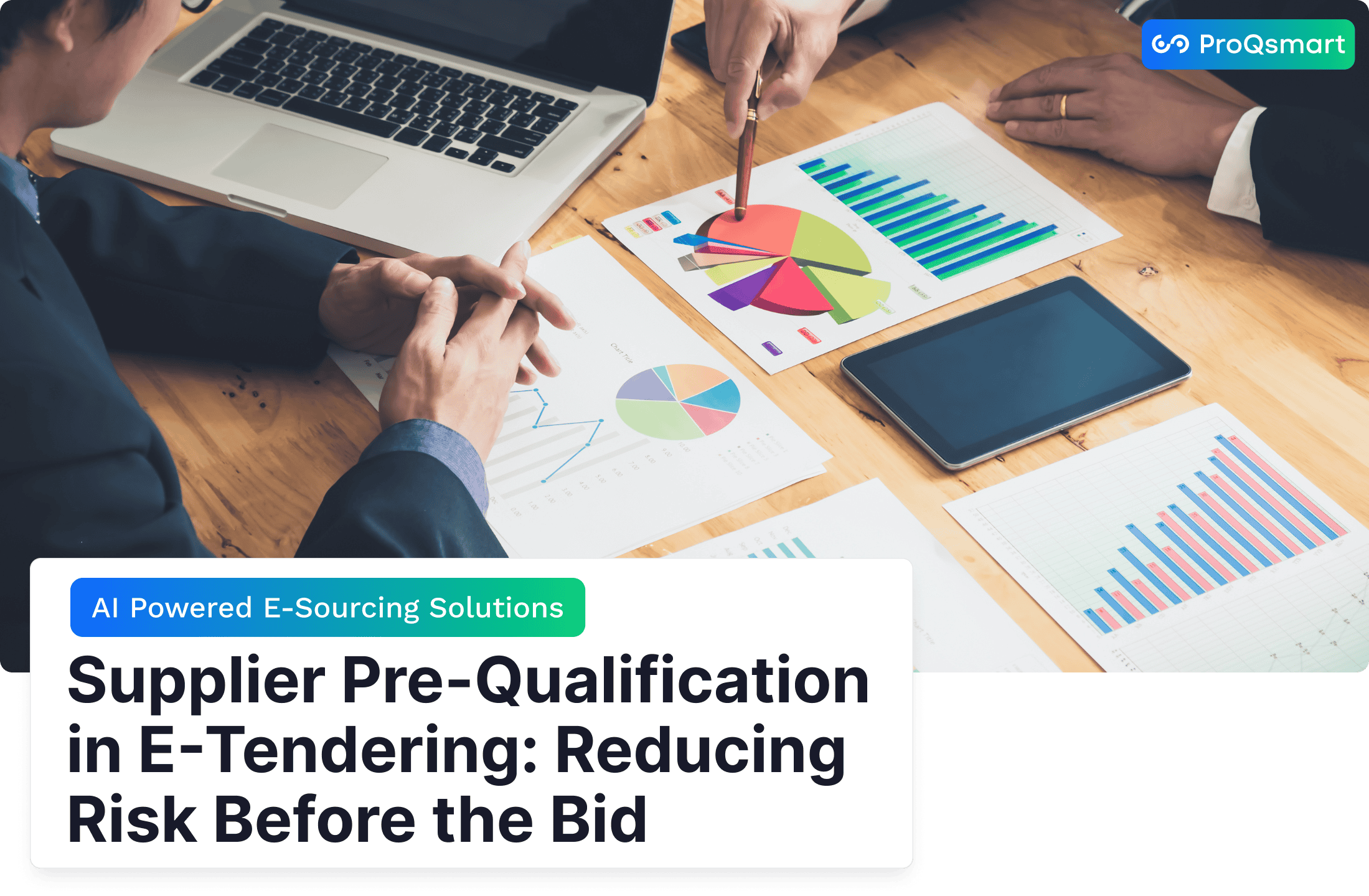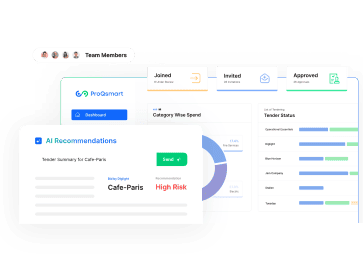Supplier pre-qualification defines the process of evaluation of suppliers prior to their invitation to cooperate in the form of electronic bidding. This process ensures that only competent and reliable suppliers qualify. It matches their qualifications and experience with the project’s unique work requirements and quality expectations.
This important step increases predictability and efficiency in the procurement process. It eliminates unsuitable suppliers from the start, reducing risks and saving time during the tendering stage. Typical pre-qualification criteria are financial stability, technical expertise, past performance, and compliance with legal and ethical standards.
By incorporating supplier pre-qualification into e-tendering processes, organizations can create a more transparent, informed, and effective decision-making process while building better relationships with suppliers. The following sections explore the key components, benefits, and best practices to help you optimize this critical aspect of your procurement strategy.
What is Supplier Pre-Qualification?
Supplier pre-qualification is an intentional, systematic process that involves the prequalification framework to prequalify and preselect prospective suppliers before inviting them to tender in the bidding stage. This rigorous evaluation instills confidence that suppliers possess the necessary capabilities to deliver on contracts.
Focusing on the supplier’s experience, capacity, and expertise, the prequalification process effectively identifies those lacking the resources to meet specific contract requirements. This is particularly valuable in industries like construction, IT, and facilities management, where the stakes are high and project outcomes hinge on reliable partnerships.
Through the prequalification process, agencies can gather crucial information such as a supplier’s financial soundness, operational capacity, and compliance record. To meet the needs of various stakeholders, buyers might employ scorecards and checklists as part of their sourcing process to standardize evaluations, ensuring that no critical success factors are overlooked.
Advanced strategic sourcing tools enable procurement teams to evaluate and qualify suppliers systematically, thereby mitigating risks associated with unqualified vendors. A major advantage of pre-qualification is its ability to save time during the procurement cycles.
Platforms like ProQsmart are simplifying the prequalification process by automating it. They provide instant access to supplier data for third-party auditing, ensuring compliance and transparency throughout the entire procurement landscape.
Why Pre-Qualify Suppliers?
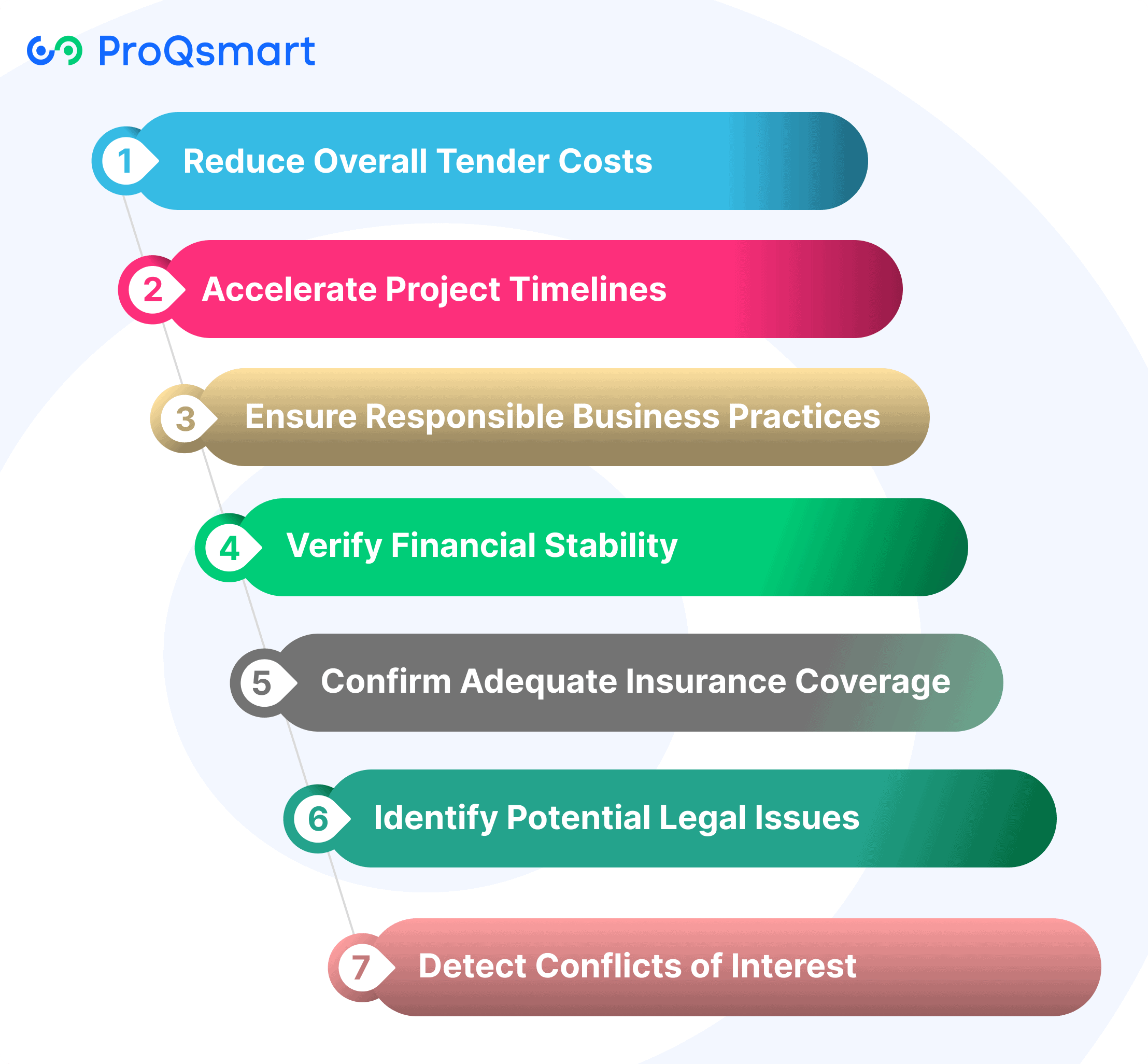
When it comes to e-tendering, pre-qualifying suppliers is a foundational building block that results in more efficient, compliant, and risk-averse procurement processes. Not only can you cut costs and account for various risks, but a thoughtful pre-qualification process allows you to create a culture of accountability.
This proactive practice helps create a success-oriented vendor landscape and paves the way for more efficient procurement processes down the road.
1. Reduce Overall Tender Costs
Pre-qualification is a powerful means to filter out unqualified bidders saving time and costs on tendering. Suppliers that do not have basic certifications, such as ISO 9001 for quality management, are filtered out immediately.
This advance screening prevents wasted time and money. This saves time and repair down the street due to getting the incorrect suppliers on the primary attempt. Fewer contract disputes and fewer associated financial risks arise when you select vendors with proven capabilities.
You have fewer contract disputes, lowering your financial risks. A quality pre-qualification process sets the foundation for fair procurement decisions that are in the best interest of project budgets and community deliverables.
2. Accelerate Project Timelines
By limiting the bidding pool to a handful of pre-qualified suppliers, you remove the burden of extensive supplier evaluation from the bidding process. This accelerates the tendering process and allows for quicker procurement decisions, helping projects remain on-time.
For example, with a pre-qualified shortlist of five suppliers, it only takes one review of bids received to onboard, simplify supplier checks, and accelerate getting moving.
3. Ensure Responsible Business Practices
Pre-qualification creates a sensible marketplace and rewards efforts to be more ethical and sustainable. It ensures suppliers comply with workplace safety standards, regulatory compliance, and social responsibility policy guidelines.
This covers background checks and certifications, safety training programs, and accident reporting procedures. Having responsible suppliers helps your organization build safe and accountable supplier partnerships.
4. Verify Financial Stability
By evaluating a supplier’s financial health during the prequalification process, you can mitigate the risk of catastrophic failure. Credit checks and verification of statements and bank references help build relationships with capable suppliers who make dependable business partners in the long run.
5. Confirm Adequate Insurance Coverage
Providing verification of their insurance, including liability and workers’ compensation insurance, is crucial in the prequalification process, ensuring that any damages or injuries during performance are covered. This procedure protects the purchasers from potential loss and safeguards against non-fulfillment from capable suppliers.
6. Identify Potential Legal Issues
The prequalification process reveals legal disputes or compliance violations, safeguarding procurement integrity through thorough documentation.
7. Detect Conflicts of Interest
Open and transparent supplier relationships eliminate any conflicts of interest and promote healthy competition among suppliers. Suppliers need to be open about affiliations to improve procurement integrity.
With ProQsmart, pre-qualification is automated, driving compliance, process efficiency, and transparent supplier management.
Key Steps in Pre-Qualification
Effective supplier pre-qualification in e-tendering establishes the foundation for a successful procurement process. By systematically evaluating potential suppliers against prequalification criteria, you can ensure alignment with project goals, regulatory standards, and operational efficiency.
Project Scope and Requirements
Taking the time to clearly define the project scope and requirements is key in developing the prequalification process. Well-defined, specific project criteria encourage the best bidders to respond and limit incompatibility from the start. Collaborating with other stakeholders, such as engineers or financial planners, helps refine these prequalification requirements, ensuring every angle is addressed. This clear scope allows for a greater understanding and prevents holdups during the tendering process.
Compile a List of Potential Bidders
The development of a strong and diverse tenderer list is essential. Start with a broad list of suppliers that have experience applicable to your project. Prevent mis-matches, like deciding on a contractor with residential knowledge only to construct facilities like a data-center.
Try to pre-qualify 6 to 8 firms to ensure a competitive field. Using databases and networking helps identify a wider pool of specialized, qualified vendors, and keeping these updated provides a go-to list for future projects.
Develop a Comprehensive Pre-Qualification Document
The pre-qualification document is the basis for comparative evaluation. It needs to set out clear submission guidelines, criteria for compliance and criteria for specific projects, such as Cyber Essentials for IT projects.
ProQsmart’s intelligent, AI-driven tools simplify the document-preparation process to help you craft a clear, compelling case that aligns with your goals.
Evaluate and Score Responses
The use of standardized prequalification criteria, including weighted scoring models for financial stability and past performance, eliminates favoritism. Joint evaluations enhance precision, identifying the most capable suppliers ready to meet your procurement needs.
Provide Recommendations
Providing clear, transparent recommendations that stem from those evaluations will help establish trust with your community. Well-documented prequalification processes help with matching expectations to designate and/or clients and protect decisions made with auditable documentation.
Benefits of Pre-Qualification in E-Tendering
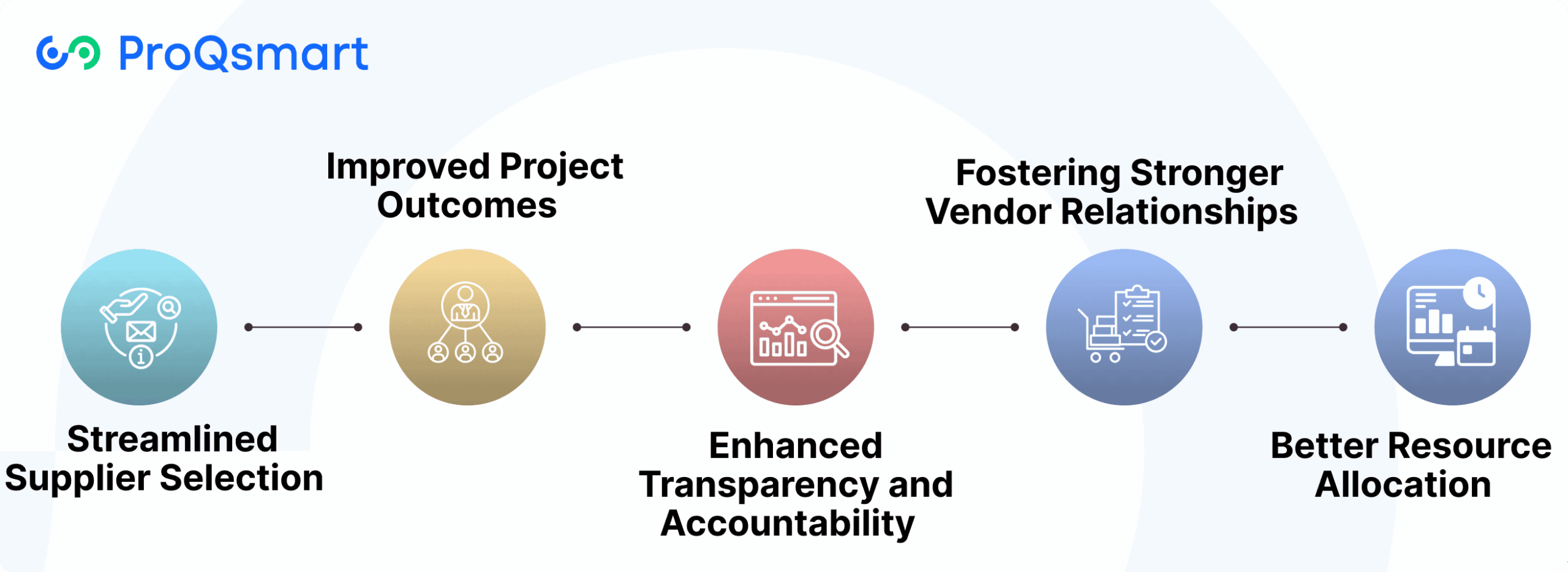
Pre-qualification in e-tendering is a forward-thinking approach that streamlines procurement processes, enhances transparency, and supports the achievement of organizational goals. By vetting suppliers prior to the bidding stage, you’re able to make more informed decisions and run a more efficient operation.
Key benefits include:
-
Improved supplier evaluation, hence decreasing their submission duration by up to 50%.
-
Improved project outcomes through reliable suppliers with proven expertise.
-
Improved transparency, providing greater clarity on who has bid and at what time.
-
Stronger vendor relationships built on trust and accountability.
-
More efficient use of scarce resources from better aligning supplier capabilities with project requirements.
Streamlined Supplier Selection
Pre-qualification simplifies supplier selection by filtering out unqualified bidders, ensuring only capable vendors move forward. For example, firms that specialize in transit planning will not find themselves out of place on highway widening projects.
This process naturally reduces bidder lists, further facilitating better tender management and overall efficiency. You save procurement timelines too, saving time by only going after the competitive bids that you get from peer-qualified suppliers.
Pre-qualification fore-tendering platforms such as ProQsmart automatethe pre-qualification process, making workflows more efficient and enabling faster contract awards.
Improved Project Outcomes
By choosing suppliers who have the necessary insurance coverage and a proven track record, you reduce your risks and potential disruptions. For instance, comprehensive evaluations save downstream time lost from underperforming vendors.
Nearly continuous performance monitoring, made feasible by tools such as ProQsmart,helps to certainly keep a project on target and achieve long-term goals.
Enhanced Transparency and Accountability
Transparent and objective evaluation criteria foster confidence between the owner and the potential suppliers. Consistent recorded evaluations and clear lines of communication regarding supplier standings result in incredible transparency.
Through this method, compliance risks are drastically reduced while increasing trust in procurement decisions.
Fostering Stronger Vendor Relationships
Frequent, clear communication—including celebrating the supplier’s performance—builds trust between buyers and capable suppliers. Platforms like ProQsmart incentivize this sort of collaboration, enhancing the prequalification process for more effective long-term partnerships.
Better Resource Allocation
Identifying skilled suppliers through a robust prequalification process optimizes procurement resources. Real-time tracking and assessments, as offered by ProQsmart, ensure ongoing alignment with project needs and budgets.
Overcoming Pre-Qualification Challenges
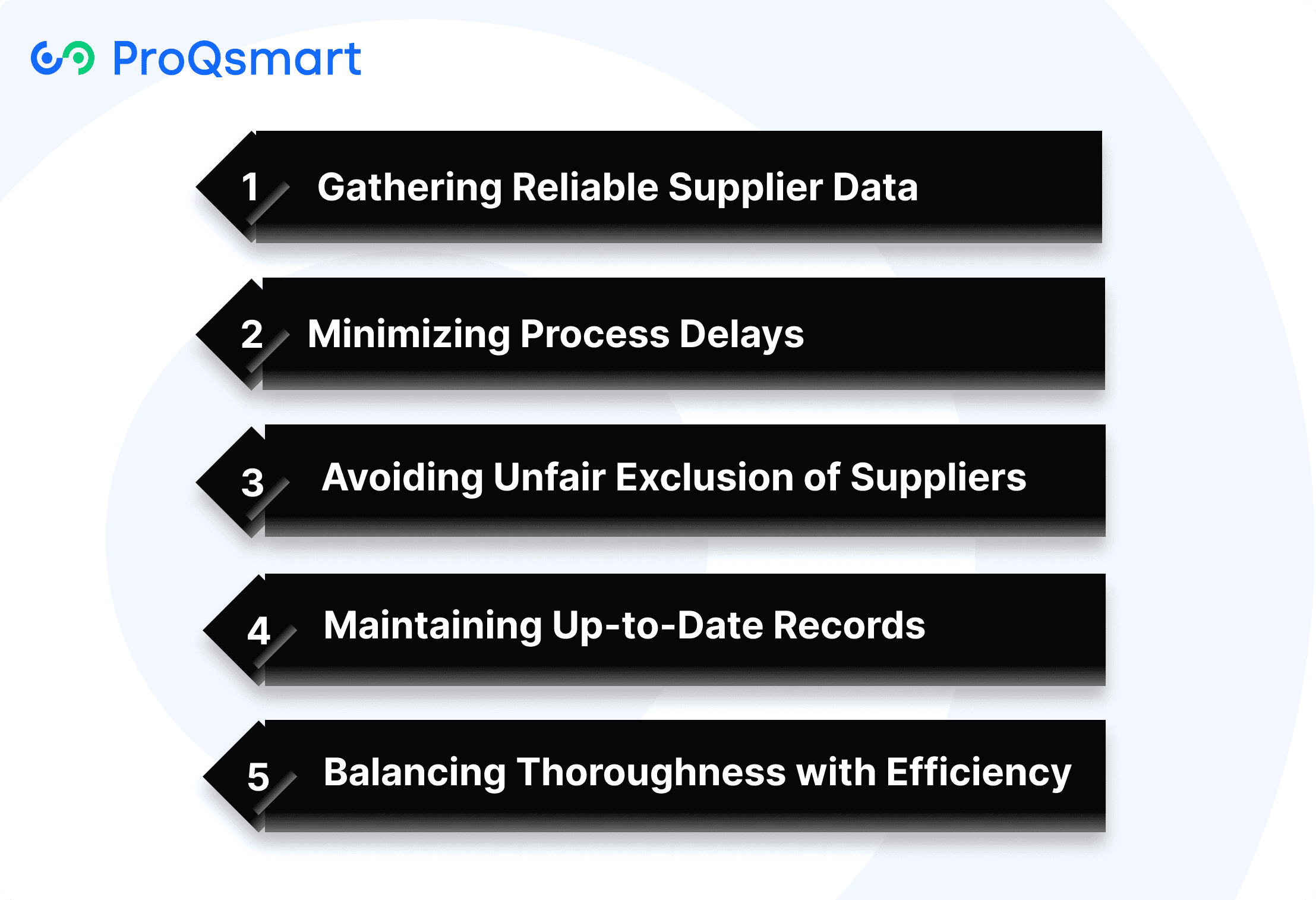
The pre-qualification stage in e-tendering can be an obstacle creating a barrier to procurement efficiency. Assemble trustworthy supplier information and reduce steps in the process. Prevent arbitrary disqualifications, keep current paperwork on file, and ensure that due diligence doesn’t come at the cost of speed.
By addressing these concerns in a thoughtful manner, it makes for an easier and clearer process for all involved.
Gathering Reliable Supplier Data
Quality supplier data should be the foundation on which all effective pre-qualification is built. It’s become increasingly important to confirm claims with third-party auditing, working to ensure that suppliers are upholding industry standards.
While certainly more complicated, centralized databases—like ProQsmart—make this much easier by systematically tracking and collecting supplier qualification records. ProQsmart’s AI-powered technology allows for instant supplier performance monitoring to drive immediate, data-backed improvements.
Continuous monitoring of key performance indicators will get businesses out ahead of any potential compliance attack dog risks.
Minimizing Process Delays
More often than not, delays in the procurement process result from lack of guidance on a timeline or broken processes. Setting up a clear communication protocol with suppliers and utilizing systems such as ProQsmart enhances the prequalification process, making it easier to manage.
Avoiding Unfair Exclusion of Suppliers
Equal opportunity prevention practices, outreach, and monitoring are key to creating a level playing field. Establishing clear criteria and conducting ongoing evaluations keep the best-suited suppliers from being locked out.
With ProQsmart’s powerful subcontractor management features that automate pre-qualification, you can be sure diverse suppliers’ capabilities will be identified and leveraged.
Maintaining Up-to-Date Records
Up-to-date supplier information is key to making good buying decisions. Additionally, some platforms require annual audits and contractor registers, further reducing risk by 90%.
ProQsmart follows this up with real-time tracking, allowing for unprecedented transparency in procurement operations.
Balancing Thoroughness with Efficiency
Finding that appropriate balance will be key. With the help of digital solutions like ProQsmart, companies can rapidly cut down tasks, saving time and cost without losing the thoroughness required.
Automated workflows and data-driven insights ensure more precise, yet faster, decision making to keep procurement in step with broader organizational goals.
Best Practices for Effective Pre-Qualification
Done well, the supplier prequalification process is the foundation of successful e-tendering, leaving a level playing field open to better competition with a greater chance of delivering successful projects. By employing some best practices in the prequalification framework, you can make the process more efficient and effective, all while promoting transparency and collaboration.
Establish Clear and Relevant Criteria
Creating clear, specific criteria based on your project priorities means that only the most qualified suppliers will submit bids—saving time and money for all.
For example, requiring suppliers to deliver periodic ESG reports can ensure that all work remains on the right side of those sustainability targets. Fewer, clearer benchmarks make it easier to evaluate the proposals and motivate suppliers to exceed what you want and expect.
Leverage Digital Tools for Efficiency
Digital platforms, such as ProQsmart, are essential to e-tendering.With ProQsmart, you can automate workflows, simplify your document management process, and strengthen your relationships with your suppliers seamlessly in real-time.
In fact, these tools can cut costs and resource consumption by as much as 80%. Equipping staff to use them effectively and holding staff accountable with regular performance checks are important steps. Platforms like ProQsmart, enable ongoing supplier monitoring as well,protecting you by monitoring for compliance long after the initial vetting.
Ensure Fair and Objective Evaluations
Implementing standardized scoring models protects against favoritism and the appearance of favoritism. Group evaluations within the team encourage consensus and a more informed decision.
Adding an example here, third-party audits or site visits could play a role in verifying supplier compliance with safety and performance standards.
Conduct Regular Supplier Reassessments
Regular evaluations, such as performance reviews or third-party validations, ensure continuous quality from these capable suppliers. Open communication about prequalification criteria and performance metrics fosters trust and improvement.
Maintain Data Security and Integrity
Secure platforms centralize sensitive supplier data, preventing unauthorized access. With auditable data management built-in, ProQsmart as a pre-qualification solution protects data and claims for complex, multi-site organizations.
Ongoing training with empathy on security and best practices creates a culture of support that further protects data integrity.
Conclusion
Supplier pre-qualification is a crucial step in creating a more streamlined and efficient e-tendering experience. By emphasizing transparency of criteria, extensive evaluation, and standardized procedures, you can foster better supplier relationships and ensure safer, successful projects. A robust pre-qualification process not only mitigates risks but also sets you up to choose the best partners, saving time and leading to more and better-quality deals.
Investing in this initial step is invaluable for establishing long-term value for your company. By refining your approach and continually improving the pre-qualification process, you can create a more trustworthy procurement system that yields dividends in efficiency and economic development.
To enhance your pre-qualification process and transform your procurement strategy, explore ProQsmart and book a demo today. Discover how their innovative solutions can help streamline your supplier management, improve compliance, and drive business success.

